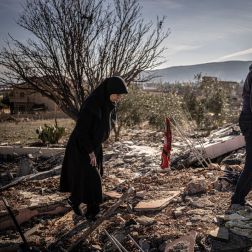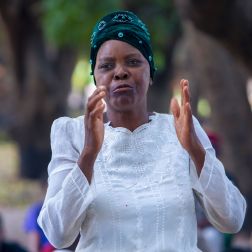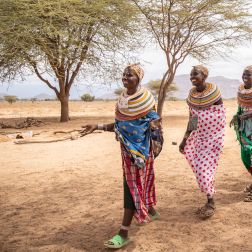- 4 mins read time
- Published: 25th November 2020
The Digital World - Experiences and insights from feminists in MENA
November 25th is International Day for the Elimination of Violence Against Women and Girls. This year, it comes one week after hundreds of thousands of intimate images of Irish women were released online without their consent or knowledge.

All types of violence practised offline are reflected online as yet another patriarchal space.— Hayat Mershad, Lebanon
Since early 2000, digital technologies have had continuously and rapidly changing implications for the way the world around us works. Technology has transformed how we interact socially, engage in public debates and political discourse, and organise and mobilise for social change – providing space and tools for innovation and new ways of working.
Since the pandemic halted our “normal” way of life, the use of digital platforms has considerably intensified, and so to have the risks for women using these platforms.
To delve into this a little deeper, we interviewed young feminist activists from the Middle East and North Africa (MENA) to highlight the experiences and aspirations of young women and feminist activists in the MENA region around digital spaces, safety, and rights.

Whenever women are more visible, they pay the price.— Maya Ammar, Lebanon
For context, the MENA region is characterised by deeply embedded patriarchal social norms and oppressive authoritarian regimes.
Women are confined to roles prescribed by those norms, their personal freedoms are constrained, and their participation in public spaces is restricted. So, digital platforms have emerged as an alternative space for women to overcome these restrictions, by facilitating their engagement in public debates and their ability to voice their demands and to have a stronger collective voice.
However, despite providing an alternative, the digital space reflects, or mirrors, the patriarchal social norms of the offline world that normalise violence and protect perpetrators. The digital space has also intensified existing inequalities and harmful norms and practices during the COVID-19 pandemic, leading to what has been dubbed a “pandemic of online gender-based violence”.
To make matters even worse, state-sanctioned surveillance puts restrictions (and sometimes threats) on Internet users – creating further manifestations of systemic oppression and control over the way women represent or express themselves in digital spaces.

Digital technologies are a double-edged sword.— Suhair Faraj, OPT
Digital platforms have already proven to be a useful, accessible, and cost-effective tool for feminist and women’s rights organisations (WROs) in their work towards social change. When face-to-face communication and movement are restricted, such as in the Occupied Palestinian Territory (OPT) due to occupation and geographical fragmentation, or during the recent uprisings in Iraq and Lebanon, or yet again, during the COVID-19 pandemic, their work has been significantly facilitated by online tools and platforms. WROs have been able to sustain their work, reach more people, disseminate critical information, and continue responding to the needs of women and their communities.
These platforms, nevertheless, also open the door to individual and mass attacks against those organisations, the women involved, and the content itself.

The digital space is not a safe space, but it’s a brave one.— Lilav Ihsan, Iraq
Women’s rights and feminist movements have been a critical force for social change in MENA, but they face increased restrictions in a region where civic space is closing at a dangerous pace. Digital platforms have offered an alternative space for discussions, mutual learning and support, as well as solidarity and resistance through garnering collective power.
However, feminist activists regularly face violent attacks, threats and defamation campaigns whenever they are active online. They are often silenced when they express their opinions, engage in political debates, or speak out against violence and harassment.
So, while the digital space provides room for resistance and solidarity, it is also a tool in the hands of the oppressors.
Despite the constant risks associated with the digital space, it remains a public space that is constantly being claimed and reclaimed by women across the region – as is the actual world around us where women struggle to remain present and safe.




